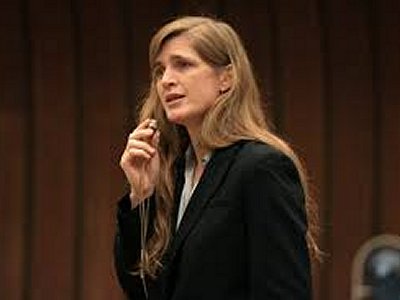
SAMANTHA AND THE POWER OF LAMENT
To lament in worship is not the same as being miserable.It is an active form of protest which grapples with God and the love we know he has for the world in Christ.
Is there literally nothing that can shame you? Is there no act of barbarism against civilians, no execution of a child that gets under your skin? That just creeps you out just a little bit? Is there nothing you will not lie about, or justify?
These were the words of the outgoing US Ambassador to Bashir al-Assad and Russia in the United Nations in December 2016 as eastern Aleppo fell under an onslaught so savage that the UN itself described it as a ‘complete meltdown of humanity’. Having spent part of her earlier career in academia producing a remarkable study of modern genocide, A Problem from Hell, Samantha Power has vested great intelligence and emotion in addressing such issues. Some people thought the US was poorly placed to commentate in such a way on a war in the Middle East, but Power herself felt otherwise. It is hard to place moral parameters around the act of killing strangers in cold blood, but not to try unleashes dark impulses. In Aleppo we watched an old theory of unjust war play itself out. That is, if we watched it at all.
It is profoundly uncomfortable to consume news over an informal TV dinner or at the end of a long day, when all we want is to be entertained. The moral dilemma of our generation is what to do with the horrors we witness through a lens. When Bashir al-Assad’s father razed the city of Hama to the ground in 1982, killing up to twenty thousand men, women and children in the process and doing unspeakably nasty things to the Muslim Brotherhood fighters they captured, few people even knew it was happening. Today we get live Twitter and YouTube feeds from trapped civilians, pleading for help, preparing for death.
If Samantha Power was reduced to an - admittedly eloquent - expression of rage with the might of the US Government behind her, we can’t be too hard on ourselves for our own passivity. But there is still a question nagging away. To lament disaster in prayer has always been a feature of faith in God. We do very little of it in the peaceful, developed world today because there is not much to lament in our corporate life and, when there is, now approach our grief, anger and despair in a different way. All too often, this is to condemn those who do not express the right emotions at the right time. And what determines ‘right’ often emerges from the ether in an odd, indefinable way.
Scripture is filled with lamentation but we don’t recognise it because there is so little of it around today. Individual people who rail against God for misfortune are rarely joined in this by others and, in any case, there is something deeply communal about the experience. To lament in worship is not the same as being miserable, which, frankly, some of the ways we gather together before the Lord demonstrate. It is an active form of protest that grapples with the God of creation and the love we know he has for the world in Christ.
Those who trust in Jesus know he has experienced the worst for this world, so that it may one day inherit the best, but there remains an aching sense that people continue to suffer deeply while we wait for the coming kingdom. Our shared worship is at its best when it weaves lament into the fabric; when we protest to God, in reverence, that he is good and powerful but we inhabit a world where the strong endlessly punish the weak. What our worship should never do is become a slave to the prevailing search for happiness. When this happens, we settle for less than we are called to in Christ.
Our happiness is not assured by the avoidance of other people’s pain. Discipleship is more authentic when we address it in active, emotional prayer. The road to personal fulfilment and public peace is through the cross, not round it. The words of Samantha Power should have struck a chord with people of faith. In their own way, they were the words of a Psalmist in despair. Read them again this way:
Is there literally nothing that can shame them? Is there no act of barbarism against civilians, no execution of a child that gets under their skin? That just creeps them out just a little bit? Is there nothing they will not lie about, or justify?
Is this, perhaps, a word of direction for the Church as it gathers for worship?
POPULAR ARTICLES

Obama's Covert Wars
The use of drones is going to change warfare out of all recognition in the next decades.

Through A Glass Starkly
Images of traumatic incidents caught on mobile phone can be put to remarkable effect.

What Are British Values?
Is there a British identity and if so, what has shaped the values and institutions that form it?


